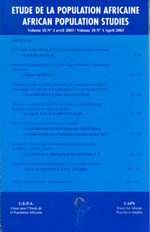
|
African Population Studies
Union for African Population Studies
ISSN: 0850-5780
Vol. 29, No. 1, 2015, pp. 1483-1500
|
 Bioline Code: ep15003
Bioline Code: ep15003
Full paper language: English
Document type: Research Article
Document available free of charge
|
|
|
African Population Studies, Vol. 29, No. 1, 2015, pp. 1483-1500
| fr |
Oginni, Ayodeji Babatunde; Ahonsi, Babatunde Aloysius & Adebajo, Sylvia
Résumé
Cette étude a analysé les données démographiques et de santé au Nigeria entre 2003 et 2013. Les résultats montrent que les besoins en matière de PF ont diminué entre 2008 et 2013 par rapport à 2003. Les déterminants les plus important sont l'âge, l'état matrimonial, l’éducation, la religion, le statut de travail actuel, la prise de décision dépenser les revenus personnels, le sexe du chef du foyer, l'état de la richesse des ménages, nombre des enfants vivant, residence rurale - urbaine, visite à domicile par les travailleurs de PF et l'exposition aux messages de PF via les médias de masse. En conclusion, programmeurs PF continuent à élaborer des réponses spécifiques qui répondent aux barriere de contraception.
Mots Clés
besoins; planification de la famille; déterminants
|
| |
| en |
Trend and Determinants of Unmet Need for Family Planning Services among Currently Married Women and Sexually Active Unmarried Women Aged 15-49 in Nigeria (2003—2013)
Oginni, Ayodeji Babatunde; Ahonsi, Babatunde Aloysius & Adebajo, Sylvia
Abstract
This study examines trend and determinants of unmet need for family planning (FP) among currently married women and sexually active unmarried women of reproductive age 15-49 in Nigeria over a period of 10 years (2003-2013). Data from three consecutive Nigeria Demographic and Health Surveys (2003, 2008 and 2013) were analyzed. The results show that the unmet need for FP declined between 2008 and 2013 to a level less comparable with the situation in 2003. The significant determinants of unmet need for FP included age, marital status, education, religion, current work status, decision-making on spending personal earnings, gender of household heads, household wealth status, number of living children (including current pregnancy), rural-urban residence, home visit by FP workers and recent exposure to FP messages via mass media. It is therefore necessary that FP programmers continue to develop specific responses that address the barriers to contraceptive use.
Keywords
Unmet Needs; Family Planning; Women; Nigeria; Trend & Determinants
|
| |
© Copyright 2015 - African Population Studies
Alternative site location: http://www.uaps-uepa.org
|
|
